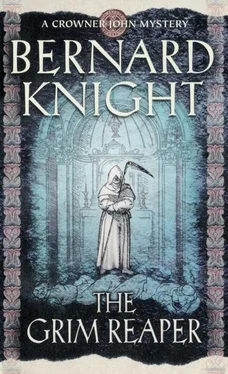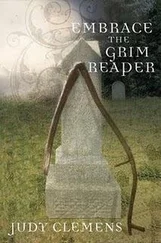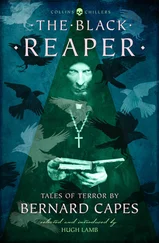Bernard Knight - The Grim Reaper
Здесь есть возможность читать онлайн «Bernard Knight - The Grim Reaper» весь текст электронной книги совершенно бесплатно (целиком полную версию без сокращений). В некоторых случаях можно слушать аудио, скачать через торрент в формате fb2 и присутствует краткое содержание. Год выпуска: 2002, ISBN: 2002, Издательство: Simon and Schuster, Жанр: Исторический детектив, на английском языке. Описание произведения, (предисловие) а так же отзывы посетителей доступны на портале библиотеки ЛибКат.
- Название:The Grim Reaper
- Автор:
- Издательство:Simon and Schuster
- Жанр:
- Год:2002
- ISBN:9780671029678
- Рейтинг книги:5 / 5. Голосов: 1
-
Избранное:Добавить в избранное
- Отзывы:
-
Ваша оценка:
- 100
- 1
- 2
- 3
- 4
- 5
The Grim Reaper: краткое содержание, описание и аннотация
Предлагаем к чтению аннотацию, описание, краткое содержание или предисловие (зависит от того, что написал сам автор книги «The Grim Reaper»). Если вы не нашли необходимую информацию о книге — напишите в комментариях, мы постараемся отыскать её.
The Grim Reaper — читать онлайн бесплатно полную книгу (весь текст) целиком
Ниже представлен текст книги, разбитый по страницам. Система сохранения места последней прочитанной страницы, позволяет с удобством читать онлайн бесплатно книгу «The Grim Reaper», без необходимости каждый раз заново искать на чём Вы остановились. Поставьте закладку, и сможете в любой момент перейти на страницу, на которой закончили чтение.
Интервал:
Закладка:
De Wolfe ran his hands through his thick hair, bunching it back on to his neck. ‘According to the sense of that text he wrote, it seems he was warning me not to investigate so persistently. Some chance he’s got of that — I’m not one to take heed of such threats!’
‘Three times he’s failed to kill,’ mused the constable. ‘Is he getting careless — or was it deliberate?’
De Wolfe snorted. ‘Not much doubt about him being serious when he tied a bag over my head! That’s how he killed the moneylender.’ His hawk-like face, with the downturned lines at each side of his mouth, was a grim mask as he vowed to catch the maniac who still stalked the city. ‘I don’t know how and I don’t know when, Ralph, but one way or another, this bastard has to be stopped,’ he declared.
The Viking-like constable pulled at his forked beard, his favourite mannerism when perturbed. ‘Where can you start, though?’
‘My guts tell me that there’s something very odd about three of the priests on the cathedral list. I’ve spoken to all of them more than once, right up to yesterday — and last night someone tried to put a permanent end to my probing.’
‘Which three?’ persisted Morin.
‘Y our namesake, Ralph, the madman from All-Hallows-on-the-Wall. Then there’s his neighbour, Adam of Dol, who wants to save us all from hell-fire — he seems to have appointed himself as protector to Ralph and gets into a great fury when I question him. And lastly Julian Fulk, who is obsessed with his own importance, through somehow I don’t see him as a killer.’
‘Many of my ecclesiastical and monastic friends are more than a little strange,’ objected Rufus of Bristol, ‘but I doubt that any is a multiple murderer.’
John shrugged. ‘I agree with you, Brother. But the fact remains that someone is killing or attacking our citizens and all the circumstances point firmly to it being a cleric.’
Ralph Morin stuck doggedly to practicalities. ‘So what can you do about it? The bloody sheriff seems remarkably uninterested in the matter, though I suspect that the Justices, aggrieved at losing your Thomas, will soon be kicking his arse.’
De Wolfe winced as a ripple of pain shot through his head from the wound but it soon passed. ‘I’m going down to aggravate those parish priests again,’ he said, with stubborn determination. ‘Especially Ralph de Capra and Adam of Dol. If I tweak their tails hard enough, in their anger they might let something drop. It’s worth a try, for I’ve no other ideas to follow up.’
The castle constable and his sergeant went off about their business, but the persistent Brother Rufus asked if he could accompany John on his visits to the parish priests. As castle chaplain, he seemed to have plenty of spare time, the coroner thought — but his tiny chapel of St Mary near the gatehouse provided only two services a day, except on Sundays so his duties were far from onerous.
‘We’ll wait for Gwyn and Thomas to come back, then walk down towards the West Gate to twist a couple of arms.’
Outside that same West Gate, the river Exe bulged out over an area of marsh and mud, cut through by leats that filled at high tide and during floods. This was Exe Island, covered in reeds and coarse grass, with some huts, a few small houses and several fulling mills. Every year when the river was in flood, some shacks were washed away and people were drowned, but during this particularly dry month, the Exe was behaving itself. Just upstream of the West Gate, the old wooden footbridge was still the only way to cross with dry feet. Below this was the ford, where all carts, cattle and horsemen had to cross, for the new bridge downstream was still incomplete. Its many long arches spanned dry ground on the city side, allowing for floodwater at spring tides and after storms on Exmoor. There was even a small chapel on this part, though the bridge was nowhere near complete, as the construction of the western part had stopped a year ago when the builder, Nicholas Gervase, ran out of funds.
Soon after Thomas de Peyne had washed himself down in the yard behind the Bush, another priest was slipping furtively into this tiny church. It was little more than a simple room poised on the upstream edge of one of the piers, projecting out on a buttress fifteen feet above the grassy mud of Exe Island. The interior was virtually bare, except for a stone shelf around the walls and a stone altar covered with a cloth, on which stood a wooden cross. The place was intended for travellers wishing to give thanks for their safe arrival at Exeter or to pray to St Christopher for a safe journey into the wild West Country. A chaplain had been appointed by the diocese, but he visited rarely.
The priest was carrying a large pottery flask and, incongruously in broad daylight, a small lantern. He produced a flint and tinder and, with some difficulty, his shaking hands managed to light the candle in the lantern, which he placed alongside the cross on the altar. Then he sank to his knees in front of it and, head bowed, began to gabble in a monotone that soon rose to become a frenzied supplication in a mixture of Latin, English and Norman French. This went on for half an hour, the man rocking back and forth on his knees, beating his breast. Finally, he collapsed on the floor and lay flat on his face, his arms and legs spreadeagled on the cool slabs.
He lay immobile like this for some moments, then silently got up and walked stiffly to the altar, picked up the lantern and the flask and moved like a sleepwalker to the open doorway. Outside in the sunlight, he walked down the unfinished bridge to where the empty roadway came to an abrupt end over the final pier that stood at the edge of the Exe’s main channel. The water flowed smooth and deep below him, as he stood with his feet near the edge.
Setting down the flask and the lamp, he pulled his long black tunic over his head and threw it on to the ground. When he kicked off his scuffed sandals, he was as naked as the moment he was born.
Picking up the pitcher, he upturned it over his head and let about a gallon of turpentine mixed with strong Irish spirits gush over his body, holding it until the last drops of the oily liquid had coursed over his shoulders, chest, belly and legs. He threw the pot aside then picked up the lantern. He moved until his toes were curled over the very edge of the masonry, and looked down at the water, moving almost silently below. Then he opened the door of the lantern and, with a cry of exultation and despair, clasped it to his chest so that the flame almost touched his skin. The light spirits ignited into an almost invisible blue flame and flashed across his body. The heat caught the heavier turpentine alight and in seconds, the man was a human torch. With another scream, this time of mortal agony, he threw up his arms and his back arched in unbearable pain.
Just outside the West Gate, two porters with great packs of raw wool were sitting for a rest, when they saw what seemed to be a flaming crucifix in the distance. With yells of alarm, they sprang up and ran down the bridge towards it, followed by one of the gatekeepers and a few passers-by. Until they reached halfway, the astonished men could still see the writing, contorting figure, from which flame and smoke swirled into the still air. But suddenly and with a final despairing cry, the living cremation pitched forwards and fell into the river below, a last hissing and bubbling marking where the body sank beneath the uncaring surface.
De Wolfe had just crossed Carfoix when shouts and the sound of running feet coming up Fore Street told him that yet another emergency was in the offing. Gwyn and Brother Rufus were with him, one on each side of Thomas, who seemed to have recovered rapidly from his ordeal.
As they neared St Olave’s church, people in the street were turning to look at three men jogging up the slope from the West Gate, shouting and waving their arms to attract his attention.
Читать дальшеИнтервал:
Закладка:
Похожие книги на «The Grim Reaper»
Представляем Вашему вниманию похожие книги на «The Grim Reaper» списком для выбора. Мы отобрали схожую по названию и смыслу литературу в надежде предоставить читателям больше вариантов отыскать новые, интересные, ещё непрочитанные произведения.
Обсуждение, отзывы о книге «The Grim Reaper» и просто собственные мнения читателей. Оставьте ваши комментарии, напишите, что Вы думаете о произведении, его смысле или главных героях. Укажите что конкретно понравилось, а что нет, и почему Вы так считаете.












